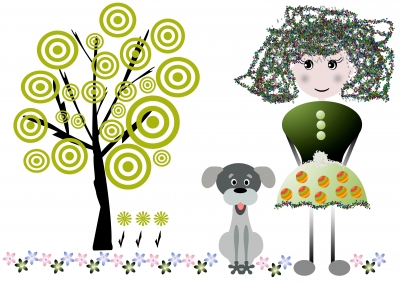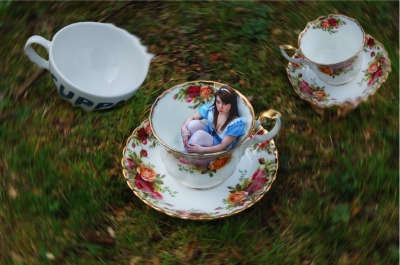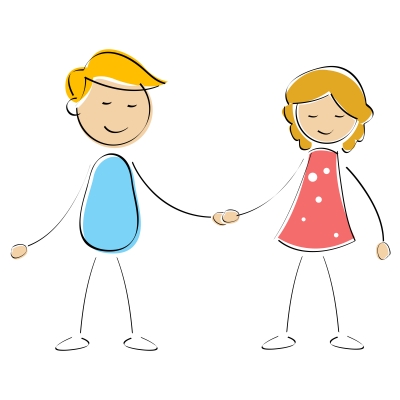Imaginary Friends - How unreal are they really?




I feel at liberty to define imaginary friends in one sentence: Imaginary friends are the mouthpieces of a person’s own thoughts and feelings and are easily created by some intelligent children and adults.
My granddaughter Mia, who will be four years old in July, had created a little brother for herself – a cheeky little boy who encourages her to break with established customs in our family. Without batting an eyelid she starts many of her sentences these days with: “My boetie says….”
(Boetie (boot-tie) is the Afrikaans word for ‘little brother’, pronounced in the same way as ‘ruby’ and 'booty'.)
Yesterday Mia said: “My boetie says if I eat carrots I'm going to change into a rabbit.”
This morning she made herself comfortable in the passenger seat instead of on the back seat where a safety belt is especially fixed for her little body. “My boetie says I must sit next to you,” she told me.
Normally we try to convince her that her little brother doesn’t understand the reasons why she should obey house rules. But this morning my curiosity took over and I questioned her on our way to school.
“Where are your boetie now?”
"At school."
“At your school?” That would be fine: A real friend she likes so much she prefers to consider him to be her brother.
“No-o.”
“Where is his school?”
“Over there.” According to her pointed finger he was a learner of the nearby high school for teenagers.
“What is his name?”
“Issie.”
He must be Jewish, I thought with no clue where she could’ve heard the name before. Perhaps he was a character in a story she had heard at school or perhaps in a movie she had seen. “So when are we going to meet him?” I asked.
“He doesn’t want to meet you.”
“Oh! May I know why?"
“He is shy… and he his afraid of adults.”
“How big is he?”
With her little hands she cutely cupped a boy who could not be bigger than a rat. I had to turn my face away, for laughing out loud would've deprived her of her self-confidence.
Mia is not the only one in the family who can see non-existing beings. Her elder sister, Dané, had seen the tooth-mouse the other day with her own eyes. “He looked just like an ordinary mouse,” she told us, “but he wears clothes - a blue jacket and black boots. He had given me a kiss on my cheek before he ran away with my tooth.” Without doubt she believed herself.
Children are often not able to distinguish between real and imaginary people, or whatever beings they create. They accept and love both in the same way and even dislikes some of them. Mia loves Father Christmas and clowns living in her imagination, but she can’t handle them when she sees them in real live.

Quotes -
Lee Ryan: "I still have imaginary friends who I talk to in my head."
Frederico Fellini: "Realism is a bad word. In a sense everything is realistic. I see no line between the imaginary and the real."
Claire Forlani: "The imaginary world has always been the most fun place for me to be."
Neil Gaiman: "This is a work of fiction. All the characters in it, human and otherwise, are imaginary, excepting only certain of the fairy folk, whom it might be unwise to offend by casting doubts on their existence. Or lack thereof."
Mary Wesley: "Writing Part of the Scenery has been a very different experience. I have been reminded of people and events, real and imaginary which have been part of my life. This book is a celebration of the land which means so much to me."
What are the pros and cons of having an imaginary friend?
Most psychologists agree that interaction with an imaginary friend encourages social-cognitive development, vocabulary, language skills and oral presentation. The imaginary friend is a buffer, protecting the child from harsh and overwhelming realities. The ‘friend’ encourages the child to rationalize and minimize matters until they are able to fit it in their frame of mind.
If not guided by responsible parents and teachers, children may learn how to manipulate others by using the imaginary friend as a pauper, or a cute little angel who deserves to be spoiled, or even a mischievous little brat looking for trouble wherever he goes. The brain may project the images in the mind in such a way that the child clearly sees them while nobody else can. These projected images may become scary creatures to live with, causing anxiety disorders and eventually serious mental disorders.
One of many possible disorders is called paracosm, a detailed imaginary world. Creating such a world does indicate a high level of intelligence and creativity, but it alienates the child from reality. Personally I believe many writers of fiction suffer this disorder.
Another disorder is erotomania, a type of delusion in which the affected person believes that another person is in love with him or her. This delusion is one of many that often occur in patients with bipolar mania and schizophrenia, though in most cases it is merely a fleeting fantasy of a person with a vivid imagination.
For a child a universe in the imagination can be almost indistinguishable from the real world. As they grow older, real truths and untruths cause wide-awakenings. To postpone acceptance of reality, sensitive souls intuitively become bookworms, movie-addicts and/or piously religious or superstitious. They easily fall prey to alcohol and drugs or any substance that may keep them in a state of euphoria.

Reality is not easy to cope with -
Since I can remember I have tried many ways to escape from reality.
I had a few imaginary friends in my childhood. I could not see them with my eyes, but clearly with the eye of my mind. They were always with me, although I tended to forget about them while I played with real friends.
At the age of twelve I replaced them all with a diary. For many years my diary was my best friend and confidant. Constant in my mind was also God and Dear Jesus and the Holy Spirit. Achieving my goals in life was possible because I honestly believed they were the sources of my courage, strength and perseverance. I still believe that, although my perception of them had changed. God is no longer a human-like being with hands, ears and eyes, the Holy Spirit is no longer tongues of fire and Jesus is not a young bearded Jew in sandles sitting on a throne at the right side of God, interceding for all his followers.
Eventually I’d learned how to write stories. It is surely paracosm: Creating characters to play the roles of friends and foes, creating interesting backgrounds for specific topics, then plotting reality in such a way that I as well as others can feel happy and comfortable with it. Most of the time we are happier while we write or read stories than we are while we are handling real live and all its issues.
Making friends in Cyberspace, interacting with them as if they are in flesh with me, believing they really like me and care about me, must be a form of erotomania.
But who cares? I am still considered 'normal' and I have not yet heard of a person who has been admitted to a mental institution because he interacted with people in an imaginary world called Cyberspace.

Imaginary Companions and the Children Who Create Them by Marjorie Taylor -
In her book “Imaginary Companions and the Children Who Create Them”, psychology professor Marjorie Taylor of the University of Oregon debunked the idea that the presence of an imaginary friend indicates the absence of real friends and beloveds in a child's life. Her own daughter invented an imaginary friend at the age of three, one Michale Rose who had a barn filled with giraffes. After Taylor and her colleagues had studied hundred children, she rejected all the old assumptions of researchers who maintained that kids invent imaginary friends for dark reasons. “Having them is often just plain fun,” is her conclusion. She also learned that extroverts tend to create imaginary friends and not introverts as psychologists of the past preferred to believe.
Marjorie Taylor also says that it is normal for older kids (post-preschool) to continue to consort with imaginary friends. She even cites several famous adults who openly admitted having imaginary friends. Paul Taylor, a cultural icon in the world of dance, attributed some of his work to his imaginary friend, George H. Tacet, Ph.D.
So I’ve decided to dedicate this hub to all my imaginary friends who do not only exist in my mind and imagination, but also in real life somewhere on this planet.

Hubs about imaginary friends ~
- My Imaginary Friend
Imagination is the key to our dreams. It is the stories our imaginations make for us that we need to hold dear and make our guiding light. Never let your imagination rest. It will lead you far. - Haiku - Imaginary Friend (Sunshine625)
Imaginary friends are your buddy system. They are there when you need them and in some cases, even when you don't. This haiku tribute is in honor of my imaginary friend...








